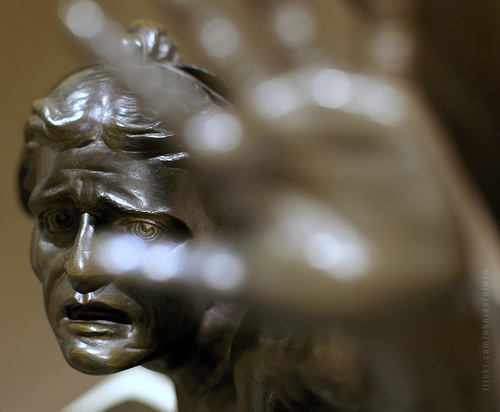We run our website the way we wished the whole internet worked: we provide high quality original content with no ads. We are funded solely by your direct support. Please consider supporting this project.

Why Did God Allow Evil?
Is it possible to force people to love? Powerful people may be able to force others to do just about anything. Through psychological or physical torture, they may succeed in forcing them to curse their own children to deny their faith. They may even succeed in forcing others to act and say loving things to them. But no one can force another person to actually love them.
But God created us, someone might respond, so he need not coerce us to love him. He could simply create us with an unquenchable desire to love him. In this case we would choose to love God simply by virtue of how we were created. I suggest that this supposition also conflicts with our experience.
Consider this analogy: Suppose I were able to invent a computer chip that could interact with a human brain in a deterministic fashion, causing the person who carries the chip to do exactly what the chip dictates without the person knowing this. Suppose further that I programmed the chip to produce “the perfect wife” and inserted it in my wife’s brain while she was sleeping. The next morning she would wake up as my idea of a perfect wife. She would feel, behave and speak in a perfectly loving fashion. Owing to the sophistication of the chip, she would believe that she was voluntarily choosing to love me in this fashion, though in truth she could not do otherwise.
Would my wife genuinely love me? I think not. Proof of this is that I (and hopefully all husbands) would eventually find this “love” unfulfilling. I would know that my wife was not experiencing these loving feelings or engaging in this loving behavior on her own. In reality, I would simply be acting and speaking to myself through this sophisticated computer chip. My wife’s behavior would not be chosen by her, so she would not really be loving me at all. She would become the equivalent of a puppet. If I want love from her, she must personally possess the capacity to choose not to love me.
If God desires a bride made up of people who genuinely love him (see Jn 17)—who do not just act lovingly toward him—he must create people who have the capacity to reject him. He must endow agents with self-determination. They, not he, must determine whether or not they will love him and each other. And this, I submit, explains why God created a world in which evil was possible. If love is the goal, it could not be otherwise. God chose to create a world in which evil is possible only in the sense that he chose to create a world in which love is possible. The possibility of evil is not a second decision God makes; it is implied in the single decision to have a world in which love is possible. It is, in effect, the metaphysical price God must pay if he wants to arrive at a bride who says yes to his triune love.
—Adapted from Satan and the Problem of Evil, pages 54-55
Image by RocPX via Flickr
Category: Q&A
Tags: Evil, Free Will, Love, Problem of Evil, Satan and the Problem of Evil
Topics: Providence, Predestination and Free Will, The Problem of Evil
Related Reading

The Earth is a Spiritual Battlefield
The early Church Fathers uniformly believed that angels, like humans, were created free and given a sphere of influence and responsibility over creation. As with humans, angels could use this influence for good, as God intended, or they could choose to use it for evil. They understood that this is simply what it means for…

It’s All About the Crucified Christ
The world was created by Christ and for Christ (Col 1:16). At the center of God’s purpose for creation is his plan to unite himself to us in Christ, reveal himself to us through Christ, and share his life with us by incorporating us into Christ. We don’t know what this might have looked like…

Friday Lights: Glimpse of the Kingdom
We interrupt the constant stream of violence and brokenness to bring you this glimpse of the Kingdom of God. Image via broken pencils are pointless

The Longing of Advent
The Advent season is a time of anticipating the coming of God, in Christ, a time of turning our imagination toward the revelation of God’s love for us. This after all is the deepest longing of our heart, and our natural longings always point us to something real. We grow hungry only because there’s such…

Loving Enemies in the Day of ISIS
The following excerpt from Myth of a Christian Religion discusses Jesus’ command to “turn the other cheek.” Whatever our response to the persecution of Christians in the world, we must take this passage seriously. While this excerpt does not tell us exactly how to respond, it can be used to shape our attitude and stance…

Your Prayers Matter
My conviction is that many Christians do not pray as passionately as they could because they don’t see how it could make any significant difference. They pray, but they often do so out of sheer obligation and without the sense of urgency that Scripture consistently attaches to prayer. The problem, I believe, is that many…
